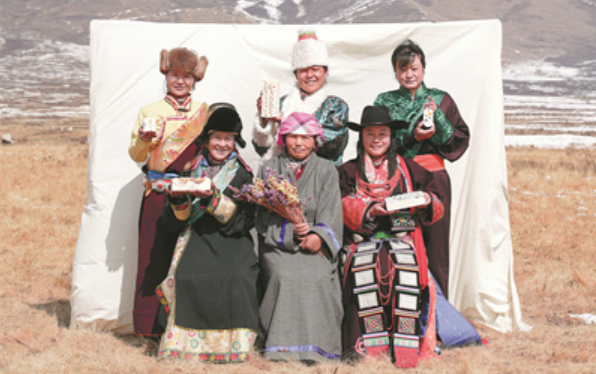
In the sweeping grasslands of Tianzhu Tibetan Autonomous County, Gansu province, white yaks (牦牛) graze like drifting clouds across the plateau. For Danmaji Niu, these animals are more than a symbol of her homeland — they are the heart of her natural soap business, Yakma Body Care.
Born into a pastoral (牧民的) community in 1989, Danmaji grew up herding yaks and drinking yak milk tea. Her grandmother encouraged her to “study hard and see the world.” That advice shaped her academic path — she worked harder than her peers and stood out in class. In 2008, Danmaji launched a water supply project to help her freezing village access clean water — a feat many doubted she could achieve. With determination and university support, she succeeded, sparking her passion for community development.
In 2016, inspired by Australia’s appreciation for organic products, Danmaji returned home to co-found Yakma. Using fatty yak milk, Himalayan pink salt, and local herbs, she and a team of Tibetan women craft moisturizing (使皮肤滋润) soaps shaped like mountain peaks and flowers. The process begins with careful measurements of natural ingredients, followed by a chemical reaction that transforms oils into soap. Each bar reflects the craftspeople’s connection to their environment.
Yakma now employs over a dozen local women, many over 40, offering flexible working hours and stable incomes. “These women have found confidence and creativity through their work,” Danmaji explains. Duoyang, a team member, shares, “I never had a chance to share ideas before, but here I have been able to show my ideas and creativity.” The brand’s sales have significantly increased by 40% in the past year, driven by growing demand for eco-friendly products. “Consumers today are concerned about quality, health, and the environment. They want to know the ingredients and how they benefit their skin. This closely corresponds with our mission.” Danmaji says.
Looking ahead, Danmaji aims to weave more Tibetan cultural elements into Yakma’s products, bridging rural traditions with urban markets. “Our hometowns hold unexploited potential,” she insists. “By valuing our roots, we can share their treasures with the world.” For Danmaji, Yakma is more than a business — it’s a movement proving that rural communities, when empowered, can thrive sustainably while preserving their heritage.
原创编写 版权所有 侵权必究! 每日更新 个性化阅读 英语飙升!
1.1. What did Danmaji Niu achieve at age 19?
A Building schools for Tibetan children.
B Starting a yak milk tea business.
C Founding a cultural tourism program.
D Launching a clean water supply project.
解析:选D。细节理解题。根据第二段中的“Born into a pastoral (牧民的) community in 1989”以及“In 2008, Danmaji launched a water supply project to help her freezing village access clean water”可知,1989年出生的她,在2008年,也就是19岁时,成功发起了一项为村庄供应清洁用水的项目。故选D。
2.2. Which word can describe Niu’s moisturizing soaps?
A Creative.
B Natural.
C Complex.
D Traditional.
解析:选B。推理判断题。从第三段“Using fatty yak milk, Himalayan pink salt, and local herbs”以及“The process begins with careful measurements of natural ingredients”可知,制作这种手工皂采用了富含脂肪的牦牛奶、喜马拉雅粉盐和当地草药等原料,且制作过程中强调对天然成分的精准计量。这些天然的原材料以及制作过程,充分体现了该手工皂“天然”的特性,所以可以用natural(天然的)来描述这种手工皂。故选B。
3.3.What can be inferred about the local women working at Yakma?
A They used to work in other industries before.
B They are mainly responsible for marketing the products.
C Their lives have been positively changed.
D They have little say in the production process.
解析:选C。推理判断题。依据第四段“Yakma now employs over a dozen local women, many over 40... Danmaji explains.”可知,Yakma为当地十多位女性,其中许多人超过40岁,提供了灵活的工作时间和稳定的收入。通过工作,这些女性不仅获得了经济上的保障,还找到了自信,激发了创造力。这从收入改善、心理状态提升等多方面体现出她们的生活得到了积极的改变。故选C。
4.4. What is Niu’s future goal for Yakma?
A Expand production to international markets.
B Maintain the ethnic identity of the product.
C Introduce modern technology into soap-making.
D Replace natural ingredients with chemicals.
解析:选B。细节理解题。根据最后一段“Looking ahead, Danmaji aims to weave more Tibetan cultural elements into Yakma’s products, bridging rural traditions with urban markets.”可知,展望未来,她计划将更多藏族文化元素融入Yakma的产品之中,以此搭建起乡村传统与城市市场之间的沟通桥梁。这一举措的核心目的在于保持产品的民族特色,让产品在市场中既保有独特性,又能传播民族文化。故选B。